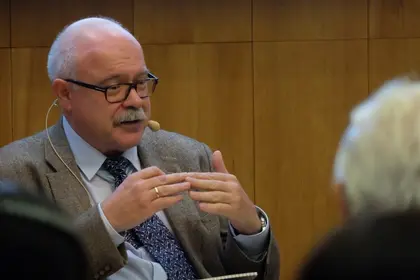In an interview with the editor-in-chief of Russia in Global Affairs Fyodor Lukyanov, the former Director of the Carnegie Moscow Center and Russia’s current Member of the Council on Foreign and Defense Policy, Dmitry Trenin, discusses in detail how to make the world afraid of Russia.
The published interview – titled “Bring back the fear!” – opens with the line: “A nuclear strike on the territory of Ukraine will not stop anyone, a strike on the territory of Europe will not be viewed as critical, but if the U.S. is struck – now that’s a completely different thing.”
JOIN US ON TELEGRAM
Follow our coverage of the war on the @Kyivpost_official.
Trenin, who like Lukyanov was a frequent attendee of international fora before the war, acknowledges that the U.S. is not adhering to Russia’s red lines since the so-called “safety instructions” were developed for periods of relative calm.
“In the American book of rules, upon which the world is buttressed, there is no such thing as our ‘red lines’. Accordingly, the only thing that can stop the U.S. in this situation, is fear – their own fear before [Russia’s] next step. That’s it, nothing else,” Trenin insists.
Commenting on what could lead to the revival of fear, which Lukyanov perceives as absent in the U.S., Trenin asserts that “there’s not much they [the Russian government] can do” while also dubbing the U.S. “an opponent.”
“The American strategy of rendering strategic defeat to Russia rests on the notion that Russia will not use nuclear weapons – because of fear or belief that the destruction of civilization is a price too high for saving its positions,” Trenin argues.

Zelensky Meets CIA Director William Burns in Ukraine
“This, in my view, is where the fatal miscalculation lies because [Vladimir] Putin’s phrase in 2018 that ‘we don’t need a world without Russia’ is stuck firmly in my head. I think of it all the time. But I don’t believe that many in the U.S. take it as seriously,” he adds.
Lukyanov remarks that the entire experience of observing Putin should have proven that he seldom says words for nothing, even though it seems that it doesn’t work on others. In replying, Trenin claims that “our colleagues, in my opinion, are trying to push forward to [direct] confrontation and deal with the so-called ‘Russian problem’.”
In his long reply to the question of how to interpret the use of the nuclear weapons doctrine if the referenda – which Lukyanov calls just that, even though they’re widely recognized as a sham – are “successful” and the “borders are modified” as a result, Trenin argues that Ukraine has been bombing Russia for some time now with U.S. and NATO weapons.
“According to our doctrine, nuclear weapons can only be used if Russia faces an existential threat. Not just some shell landing on the Russian territory, but a threat to the state’s existence”. The Commander-in-Chief is the one who assesses and decides whether the opponent’s actions pose a threat to the state’s existence,” Trenin says.
He then makes one of his most disturbing remarks, according to which he believes that “many people in the U.S. and Europe (albeit to a lesser degree in Europe) view a nuclear exchange in the European war theatre – not just in Ukraine but outside of it too – as not something catastrophic.”
“The main thing here, in my view, is to turn nuclear weapons into a functional deterrence element in a concrete Ukrainian situation and assure the U.S. that a strike on it would follow too,” he declares.
In other parts of the interview, Trenin affirms that the world is based on “fear, nothing else” and that that fear must be reinstated because when there’s none “the world ends up in danger.”
He also states that “the funnel” – a term used to describe the “so-called Ukrainian crisis” as Trenin puts it – is leading to a direct U.S.-Russia confrontation.
Commenting on U.S. President Joe Biden and the White House, Trenin mockingly says that they think they are “the smartest…better than others, wittier than others.”
“They are under the impression… that Russia is no match,” he concludes.
The Carnegie Moscow Center, part of the Carnegie Endowment for International Peace based in Washington, D.C., was shut down in April. It was considered one of the places uniting liberal and more progressive Russian analysts.
You can also highlight the text and press Ctrl + Enter






